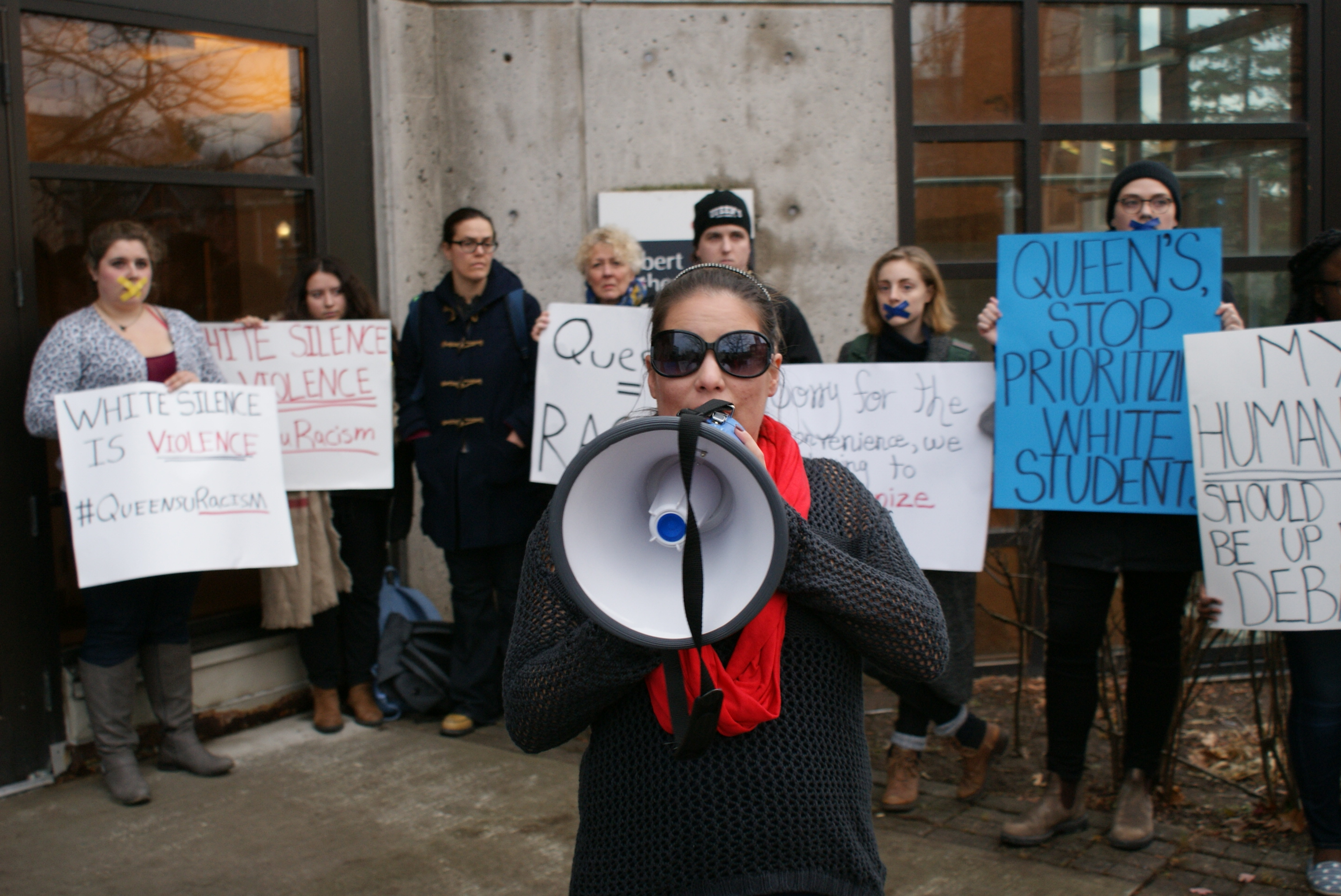National controversy flared up after the revelation of pictures from a party held near Queen’s University campus where students dressed in highly inappropriate, culturally stereotyped costumes — including Buddhist monks drinking beer, Vietcong guerrilla fighters with rice hats and toy guns, and Mexicans in sombreros and prison outfits. This is racism.
But this story is not about that party. It is about the culture of white privilege that permeates on major campuses around Canada and how activists at Queen’s University are working to make meaningful cultural change.
Evelyna Ekoko-Kay, an anti-racist activist at Queen’s University, told rabble.ca, “This school has a culture of whiteness and white supremacy and it’s a culture that is alienating to students of colour, to faculty of colour, to administrators of colour — although people have been organizing around this particular moment [the party], it is not the only moment of racism.”
In a blog post addressing the controversy, Queen’s Principal Daniel Woolf wrote, “I am forming an advisory group comprising students, faculty, and staff members to examine the issue of inclusivity at Queen’s and make both immediate and long-term recommendations for change.”
This statement was concerning for many of the anti-racist activists on campus because of a historical precedent — meaningful recommendations have routinely been left off the agenda for the governing bodies of the University. One document, the 2004 Henry Report, concludes with an endnote titled “Whiteness and the Culture of Whiteness,” bringing attention to the way white privilege functions on campus. But its important questions have been ignored by Queen’s administration.
On Tuesday, November 29, students marched to Robert Sutherland Hall calling for an end to the institutional silence on the matters of racism, white supremacy, and white privilege at Queen’s University. They were met by a backdrop of about 60 people gathering outside the Smith’s School of Business pointing, laughing, mocking and taking videos on their cell phones. However, this derision only served to strengthen the protesters’ message.
“It was a really strong message as we were standing in solidarity while all of this resistance from other students was happening. It was a really strong moment,” Payal Majithia, a protester, said.
There was also a group of protesters organized by Ekoko-Kay attending the Senate meeting inside. “We wore tape over our mouths because as visitors we were prevented from speaking and had to remain silent.” Ekoko-Kay explained.
“Some faculty members put forward this motion to act on the previous reports instead of having a new task force, then there was an effort to table that motion on the basis of senate members needing to read the reports first and refresh their memories on it. And that was what Woolf was recommending. They were going to table the motion so at that point those of us inside stood up and walked out. “
As the group of protesters was moving towards the exit, Ekoko-Kay shouted, “Racism can’t wait!”
This immediately changed the tone of the Senate meeting, which ended in an almost unanimous vote to form an Implementation Committee to begin addressing the past recommendations. This was met by cheers, laughter, and jumps for joy by the protestors outside.
Even so, the atmosphere of waiting for more committee work seemed absurd in light of the events that developed outside. Andres Caravantes, another protester present in the Senate meetings explained, “It’s indicative of the culture of whiteness at Queen’s and I think it’s interesting that…they were discussing that it’s not something that needs to happen immediately.”
Caravantes expressed frustration at the senate’s lack of willingness to acknowledge the urgency of the crisis. , “here are students out there throwing books at people who are saying racism exists on campus,” he added, referring to the crowd of students heckling the protesters. “For you to be sitting in the senate meeting and saying it’s not something that needs to be addressed right now, take a look outside and that’s exactly what’s happening.”
“Clearly the culture of racism at Queen’s is alive and well,” he said.
Another protester, Amy Ge, compared the heckling to the state of online discussion over Facebook groups, Reddit, and Twitter where white folks silence discussion through insults, intimidation, and malevolent jokes.
“I know a lot of the hostility that we’ve seen from white students was mostly online, with the Facebook posts…I just thought that seeing the hostility outside was like seeing a real life representation of how it was online.”
In regards to the extent of this victory, Ekoko-Kay said, “This is far from over and we are going to have to continue to put this kind of pressure, not just in administrative meetings, not just like in a principal’s committee — but as students protesting, and as community protesting, and as faculty protesting to continue to address racism because direct action has shown itself today to be a powerful tool in this.”
Click here to see the list of demands posed by the protestors to address racism on campus.
Like this article? Please chip in to keep stories like these coming.
Image: Kyle Curlew




